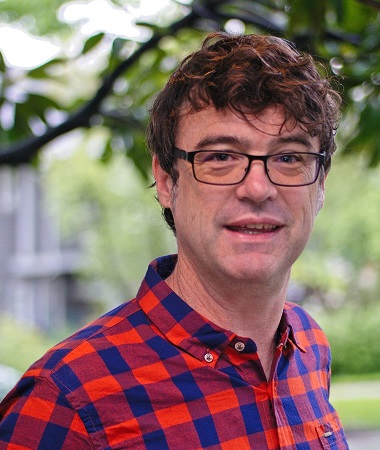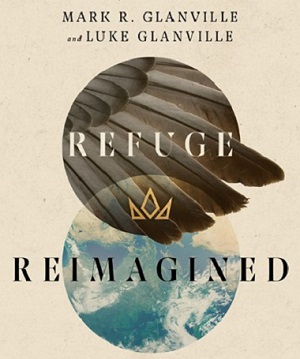
Mark Glanville is the author of Refuge Reimagined (IVP, 2021) and teaches at Regent College.
This weekly editorial gives opportunity for people to speak about issues they believe are vital for the church to respond to. We asked Anika Bauman (see accompanying article) to respond to this article, in part to model healthy conversation.
One of the goals of this weekly article is to spark dialogue – and action. We invite you to join the dialogue either here on Church for Vancouver or on the CityGate Vancouver website.
We also invite you to use the article as a discussion starter with your church small group, your church staff, your friends or your neighbours. Feel free to repost the article on your own social media. Thanks for participating in the conversation!
During the COVID-19 pandemic, ‘non-essential travel’ is being restricted both within and between many countries, but what does this mean for asylum seekers?
What does it mean for those whose ‘essential travel’ means fleeing civil war or gang violence? And what does a stay-at-home order mean for people without a home; people who have been forced to leave their home, their community and their country, in search of a new home?
Amidst a global pandemic that has caused such suffering and upheaval, refugee and immigration issues have faded from view for many people. Much attention and resources of governments have been reoriented away from the plight of forcibly displaced people and other people-on-the-move and toward matters of domestic and global health.
This is certainly understandable. But meanwhile displaced people remain displaced. And, living in cramped conditions in densely populated refugee camps or in overcrowded detention centres with limited access to sanitation or health care, many are at heightened risk of contracting the virus.
The response of some governments to the pandemic, moreover, has further amplified the vulnerability of many displaced people. Indeed, it is well known how the Donald Trump administration took Covid as an opportunity to justify ramping up already severe border restrictions.
And yet in Canada, too, Covid border restrictions have stalled the lives and hopes of thousands of people hoping to arrive in Canada.
The Canadian government will only accept into Canada refugees who were approved with permanent residence before March 18, 2020. And there remains uncertainty whether this will change in 2021. So, there is a massive and growing backlog of people being processed for resettlement here.
It is no exaggeration to say that Canada’s refugee resettlement program has been decimated during the Covid period.
Of course, travel restrictions are appropriate, given the dangers of the spread of Covid across borders. And yet it is important to remember that there are 26 million refugees globally, and that far less than 100,000 refugees were resettled in a new home last year, globally. These people fled their homes in fear of their lives, and now their lives are in limbo.
At the same time, resettlement agencies across Canada are waiting, ready to receive newcomers. And agencies are prepared with quarantine measures in order to welcome them safely.
 Christians, especially, should be concerned for people on the move. In our co-written book, Refuge Reimagined: Biblical Kinship in Global Politics, Luke Glanville and I unfold a biblical ethic of kinship for people who are seeking a home.
Christians, especially, should be concerned for people on the move. In our co-written book, Refuge Reimagined: Biblical Kinship in Global Politics, Luke Glanville and I unfold a biblical ethic of kinship for people who are seeking a home.
We show how throughout the biblical story God’s people are called to enfold people who are weak, marginalized and on the move, as family.
God wants us to reflect Jesus’ own welcome, by offering belonging and protection to people who are on the margins of society, or who don’t belong at all (e.g. Deut 10:18-19; Luke 15:1-2).
Consider the book of Deuteronomy, where refugees appear no less than 22 times. In this book, refugees are enfolded into God’s covenant (Deut 29:9-14), invited into joyful celebratory feasts (Deut 16:9-15) and protected in legal proceedings (Deut 1:16-17).
One lesson of Covid is that societies have substantial capacity to reimagine themselves and their ways of living together. During 2020-21, some countries rapidly reoriented their health and social security systems and found the money for enormous stimulus packages aimed at preserving livelihoods and securing the well-being of citizens.
Might we hope for similarly creative and constructive change in the refugee and immigration policies of countries like Canada? And, can the church play a role here, by providing an example of creative and loving welcome?
In fact, some churches in BC are taking very practical steps. Churches in Vancouver and the Fraser Valley can partner with Christian organizations such as Journey Home and Kinbrace, in order to support refugees as they seek to make a home in Canada.,
Some churches step into sponsoring refugees, receiving the blessing of friendship and love as they do. Sponsoring churches partner with denominational organizations which operate as sponsorship agreement holders.
In addition, all readers are invited to sign this Christian advocacy letter that calls upon the Canadian government to consider the travel of refugees as essential travel. We are asking the government to permit entry into Canada, while also providing for quarantine precautions.
Finally, there is another way that Christians can support people who are seeking a home. The more that churches advocate for vulnerable people generally, and the stronger the systems we have to support people who are living precariously, the better refugees do.
Refugees benefit from policies around fair wages, affordable housing and sick benefits. These policies directly impact people who arrived as refugees.
It is my hope and prayer that as Christ followers live in solidarity with refugees, enfolding them as our kin, the Canadian church can bear witness to the tenderness of Christ.
Mark Glanville is Associate Professor of Pastoral Theology at Regent College and an Old Testament scholar. Mark co-authored Refuge Reimagined: Biblical Kinship in Global Politics (IVP, 2021). Twitter: @markrglanville Website: www.markglanville.org
Dena Nicolai is Chaplain and Refugee Support Mobilizer with the Christian Reformed Churches of BC.

